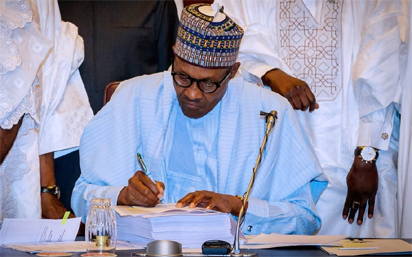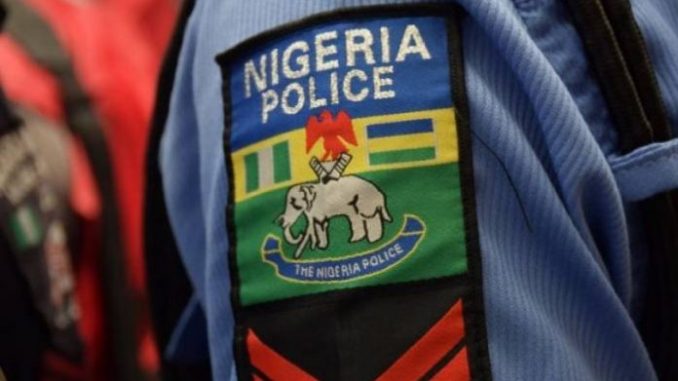
The N9.12 trillion 2018 Appropriation Bill has been signed into law by President Muhammadu Buhari. The President lamented that it would be difficult to implement because the budget figures have been tampered with by the National Assembly.
The President accused the National Assembly of cutting N347 billion from 4,700 critical projects and injecting 403 unnecessary projects at the cost of N578 billion, stressing that the proposals introduced by the lawmakers were neither properly conceptualized, designed nor costed.
President Buhari noted that the projects were supposed to be carried out by states and local government areas. The President, who did not hide his reservation on how the budget was handled by the National Assembly, said he was compelled to sign the budget in the interest of Nigerians and in order not to shut down the recovery of the economy which has been affected by the delay in passing the budget.
However, the leadership of the National Assembly claimed that the power of appropriation belongs to it and that what its members did with the budget was to ensure that all the six geo-political zones of the country were evenly treated. President indicated his intention to send to the National Assembly a supplementary budget to cover the projects cut off which, according to him, are very important to the government. He lamented that while the National Assembly cut some of the critical projects and smuggled in some personal projects, the lawmakers also went ahead to increase its budget with N14.5 billion from the initial N125 billion to N139.5 billion without any discussion with the Executive.
The President said: “I would like to thank the leadership of the National Assembly, particularly the Senate President and the Speaker of the House of Representatives, as well as all the Distinguished Senators and Honourable Members, for passing the 2018 Appropriation Bill, after seven months. “When I submitted the 2018 Budget proposals to the National Assembly on November 7, 2017, I had hoped that the usual legislative review process would be quick, so as to move Nigeria towards a predictable January-December financial year. The importance of this predictability cannot be over-emphasized. “While the Federal Government’s budget represents less than 10% of aggregate yearly expenditures in the economy, it has a very significant accelerator effect on the financial plans of other tiers of government, and even more importantly, the private sector, which mostly operates on a January-December financial year. “Notwithstanding the delay this year, I am determined to continue to work with the National Assembly towards improving the budgeting process and restoring our country to the January-December fiscal cycle.
“I note, with pleasure, that the National Assembly is working on the enactment of an Organic Budget Law, so as to improve the efficiency of the nation’s budgetary process. “As I mentioned during the presentation of the 2018 Appropriation Bill, we intend to use the 2018 Budget to consolidate the achievements of previous budgets and deliver on Nigeria’s Economic Recovery and Growth Plan, ERGP, 2017-2020.
“It is in this regard that I am concerned about some of the changes that the National Assembly has made to the budget proposals that I presented. The logic behind the Constitutional direction that budgets should be proposed by the Executive is that, it is the Executive that knows and defines its policies and projects. “Unfortunately, that has not been given much regard in what has been sent to me. The National Assembly made cuts amounting to 347 billion Naira in the allocations to 4,700 projects submitted to them for consideration and introduced 6,403 projects of their own amounting to 578 billion Naira. “Many of the projects cut are critical and may be difficult, if not impossible, to implement with the reduced allocation. Some of the new projects inserted by the National Assembly have not been properly conceptualized, designed and costed and will therefore be difficult to execute.
According to the President, some of the projects which budgetary allocations were cut include some nationally/regionally strategic infrastructure projects such as counterpart funding for the Mambilla Power Plant, Second Niger Bridge/ancillary roads, the East-West Road, Bonny-Bodo Road, Lagos-Ibadan Expressway and Itakpe-Ajaokuta Rail Project, cut by an aggregate of N11.5 billion.
He was also not happy with the slashing of N7.5 billion from the budget of some ongoing critical infrastructure projects in the FCT, Abuja, especially major arterial roads and the mass transit rail project. He said the budgetary allocation for the provision of rehabilitation and additional security measures for the United Nations Building by the FCT, Abuja, was cut from N4 billion to N100 million, noting that this will make it impossible for the Federal Government to fulfill its commitment to the United Nations on the project. He further stated that the provisions for various strategic interventions in the health sector such as the upgrade of some tertiary health institutions, transport and storage of vaccines through the cold chain supply system, provision of anti-retroviral drugs for persons on treatment, establishment of chemotherapy centres and procurement of dialysis consumables were cut by an aggregate amount of N7.45 billion.
President Buhari said it was unfortunate that such was done at a time when securing students against acts of terrorism ought to be a major concern of government. Other areas he frowned on the deductions of budgetary allocation include the provision for the Federal Government’s National Housing Programme where N8.7 billion was removed.





